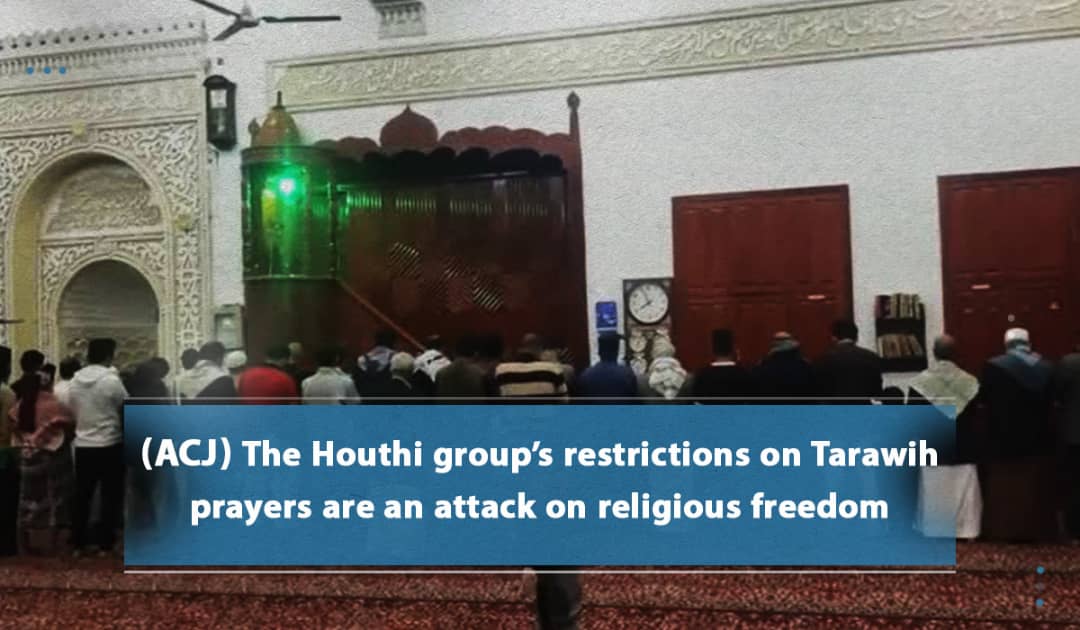

Michigan - The American Center for Justice (ACJ) said that the Houthi group continues its usual behavior every year during the month of Ramadan by restricting Yemenis from performing Tarawih prayers. The Center emphasizes that this behavior constitutes a clear attack on the most fundamental right, which is the right to worship, and it also shows a clear violation of the group’s repeated speeches regarding the freedom to perform religious rituals for all individuals.
In this context, "ACJ" indicates that the Houthi group has, during the past few days, in Sana'a and Amran governorates, restricted freedom of worship there by preventing worshipers from performing Tarawih prayers in mosques, completely in some of them and partially in others.
The group changed some of the imams of the mosques and replaced them with Houthi affiliated members, in addition to harassing the worshipers during Tarawih prayers by raising their voices and sitting in the mosques and listening to the speech of the group’s leader.
The center's field monitoring team monitored some of these incidents, including what happened in the "Attiya" Mosque, in the Shu'ub District in Sana'a, when a Houthi leader was preparing the mosque for a qat session while individuals are performing prayers, in addition to attacking the worshipers as they were leaving and trying to force them to stay and listen to the lecture of the group’s leader, which is broadcast from all mosques every night for approximately two hours.
In another incident, the ACJ team monitored members of the Houthi group harassed the prayers in the Omar bin Al-Khattab Mosque, adjacent to the house of Sheikh Saleh bin Ali Tuaiman, where he regularly prays.
In another incident, the "ACJ" team in the capital, Sana'a, monitored harassment of individuals affiliated with the Houthi group in the "Omar bin Al-Khattab" mosque in the Shamila neighborhood, adjacent to the house of Sheikh "Saleh bin Ali Tayman", where he constantly prays. These individuals harassed the imam and the worshipers several times and tried to prevent them from performing Tarawih prayers and forced the mosque to broadcast the speech of the Houthi leader. On the seventh day of Ramadan, corresponding to March 17, 2024, the Houthis attacked the imam of the mosque. Then Sheikh Saleh defended the imam and asked them to leave, but they refused and exchanged fire, which led to the death of a member of the Houthi group, while three others were wounded.
In a related context, Houthi members stormed the “Grand Mosque” in Amran Governorate, northwest of the country, and kidnapped a number of members of the Tablighi group, against the backdrop of advocacy activity conducted by the group in the region and transferred a number of them to the Houthi prisons in Khamer district.
According to those sources, the militia ordered the rest of the mosques to prevent any activity of the Tablighi Group in the district, without mentioning the reasons behind this ban.
The American Center for Justice this was not the first time the Houthi group harassed worshipers during the month of Ramadan, as this kind of violations has become a systematic behaviour. The Center noted that the Houthi group's record is full of attacks on freedom of worship and religious rituals.
According to violations monitored by the Center since 2014, the Houthi group has blown up 76 mosques and schools for memorizing the Holy Quran. The Houthi violations also affected approximately 750 mosques in Yemen, ranging from blowing up mosques, bombing with heavy weapons, and looting of all their contents, as well as turning them into weapons warehouses and headquarters for qat sessions.
The same thing was confirmed by the report of the Yemeni Ministry of Endowments for the year 2023, which the Center reviewed. The report included many statistics on violations of the right to committed by the Houthi group. The report showed that the mosques of Saada Governorate and Sanaa were the most affected ones by the Houthi violations, with 282 mosques in Sana’a and 115 in Saada Province. The number of mosques blown up by the Houthi group reached 79, while 41 others were bombed with tanks and heavy weapons by the Houthi group. Additionally, the Houthi group stormed and tampered with 117 mosques and turned 157 mosques into military barracks.
The ACJ stresses that the practices and restrictions imposed by the Houthi group on freedom of worship constitute a blatant violation of freedom of religion, belief and human rights, guaranteed to Yemenis under international conventions and the Yemeni Constitution. The center confirms that all legal laws guarantee all individuals the right to assemble and manage their religious and community affairs, as the Yemeni Constitution stipulates in Article (41) that “Citizens are equal in rights and duties.” It also stipulates in Article 52, “Residents, places of worships, and educational institutions have a sanctity which may not be violated through surveillance or search except in the cases stipulated by the law.”
The American Center for Justice (ACJ) urges the Houthi group to immediately stop the restrictions it imposes on the freedom of individuals to practice religious rituals, especially Tarawih prayers, stressing that the group is required to ensure that individuals enjoy this fundamental right instead of the violations it commits against them.